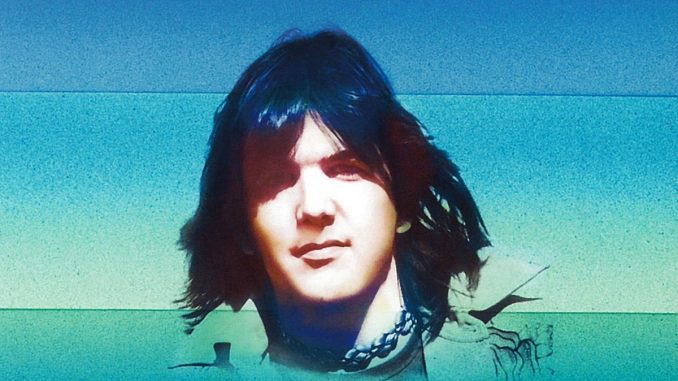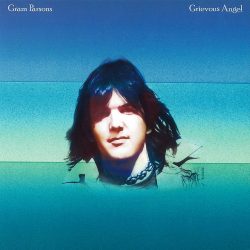
 Gram Parsons was from a privileged background but his life was full of tragedy; it was once being said that his life was like something out of a Tennesse Williams play. This tragedy would not only have an impact on the songs he wrote and those he covered, but also on his heartbreaking performances of those songs. He has been credited with the invention of what he called “Cosmic American Music” (he apparently hated the term ‘country-rock’); a hybrid of country, r’n’b, soul and rock ‘n’ roll. This invention has had a massive impact, with many artists such as Elvis Costello telling of his influence on them. In addition, many of his songs have been covered and songs have been written about him by artists such as Poco and Bernie Leadon from The Eagles.
Gram Parsons was from a privileged background but his life was full of tragedy; it was once being said that his life was like something out of a Tennesse Williams play. This tragedy would not only have an impact on the songs he wrote and those he covered, but also on his heartbreaking performances of those songs. He has been credited with the invention of what he called “Cosmic American Music” (he apparently hated the term ‘country-rock’); a hybrid of country, r’n’b, soul and rock ‘n’ roll. This invention has had a massive impact, with many artists such as Elvis Costello telling of his influence on them. In addition, many of his songs have been covered and songs have been written about him by artists such as Poco and Bernie Leadon from The Eagles.
‘Grievous Angel’ is his second and final solo album, released four months after his death from an overdose at the age of 26. Although it has been called a solo album, a key performer on it was Emmylou Harris who shared vocals with him as she had on his previous solo album ‘GP’. Parsons had previously performed on records by The International Submarine Band, The Flying Burrito Brothers and The Byrds whose ‘Sweetheart Of The Rodeo’ along with ‘Safe At Home’ by the Iinternational Submarine Band have both been cited as amongst the first country-rock albums, pointing to Parsons’ huge influence on that genre of music. However, it can be argued that ‘Grievous Angel’ is his finest album and in 2012 Rolling Stone made it number 425 in their list of the top 500 albums ever.
Parsons, whose real name was Ingram Cecil Connor III, was born into a rich family; his mother was the daughter of a citrus fruit magnate and they lived in a large house in Georgia. His mother and father were loving but his mother suffered from depression and both were alcoholics. His father, known as ‘Coon Dog’, committed suicide, devastating the then 12-year-old Parsons. His mother married Robert Parsons but eventually drank herself to death when Gram was 18 after Robert had become involved with another woman.
Parsons’ interest in music started aged 10 when he went to an Elvis concert and met the great man backstage. He listened to country, gospel, and rock n’ roll on the radio and wrote his first song aged 11. He was in rock n’ roll bands in his teenage years and flirted with folk music but didn’t really get back into country music until his time at Harvard University. Here he started listening to country greats such as George Jones and Merle Haggard and eventually formed The International Submarine Band who initially played a mixture of gospel and Hank Williams covers.
‘Grievous Angel’ was recorded in 1973 using his band from the ‘GP’ album. By then Parsons had worked with The Byrds and had gone on to form The Flying Burrito Brothers with Chris Hillman from the Byrds but was eventually fired. He was suffering from heroin addiction, had turned up in a bad state too often and missed too many gigs. In 1971 he met and started to work with Emmylou Harris and this had a positive influence. Not only did the pair work brilliantly together musically, but Harris brought some discipline to their band; they started rehearsing and so improved their live performances which were initially shambolic.
Apart from Parsons, who was producing the album, and Harris, many of the main players on the album were from Elvis’ ‘Taking Care of Business’ backing band; James Burton on guitar, Emory Gordy on bass, Glen Hardin on piano, and Ron Tutt on drums. Al Perkins, who had been in the Flying Burrito Brothers, was on pedal steel. Although Parsons often turned up to sessions in a mess, being still in the grip of heroin and alcohol addiction, Gordy recalls that there was a lot of energy from Parsons and Harris. He felt that the sessions were happy and that although there wasn’t much formal arrangement of the songs, with people playing what they felt was right, it all seemed to fall into place. In retrospect, it seems amazing that this brilliant and influential album should have been made while Parsons was in such a chaotic state.
The album starts with the wonderful ‘Return Of The Grievous Angel’ written quickly as Parsons didn’t have enough material initially and one of only six songs written by him on the album. The lyrics, which were written by poet Thomas Brown, have the singer reflecting on life on the road to his woman ‘Annie Rich’ and wanting to come home. Bernie Leadon played acoustic guitar on this and also contributed on two more tracks. ‘Brass Buttons’ was an old song from Parsons’ flirtation with folk music at Harvard and is thought to be about the death of his mother, whom he was very close to: “Her words still dance inside my head/ Her comb still lies beside my bed”
The beautiful and mournful ‘$1000 Wedding’, about a bridegroom deserted on his wedding day, alludes to a planned wedding that never was, between Parsons and Nancy, the mother of his daughter Polly. It had been recorded in an unsatisfactory way much earlier by The Flying Burritos who had been hampered by downers, booze, and pot, according to Chris Hillman. ‘Ooh Las Vegas’ had been surprisingly rejected for the ‘GP’ album. Lively musically but downbeat lyrically, it deals with the temptations of the city and their effect on the singer: “Every time I hit your crystal city/ I know you are going to make a wreck out of me”
‘In My Hour Of Darkness’, the very moving closing track on the album, was another track written quickly during the sessions and included harmony vocals from Linda Ronstadt. Prompted by the death of two young friends, the song has been alternately described as a hymn (by Harris) and as a prayer: “In my hour of darkness/ In my time of need/ Oh Lord grant me vision/ Oh Lord grant me speed”
‘Hearts On Fire’, not written by Parsons, details a love that has burned bright but now causes misery. The final Parsons composition, ‘Hickory Wind’, a fantastic song about yearning for home in difficult times, had already appeared on ‘Sweetheart Of The Rodeo’. Here it appears apparently “Live from North Quebec” along with the Louvin Brothers’ swinging ‘Cash On The Barrelhead’. In fact, the live nature was a fake with canned applause and people brought in to provide crowd noise. Other covers were Tom T Hall’s barroom rocker ‘I Can’t Dance’ and a particularly poignant version of Boudleaux Bryant’s ‘Love Hurts’, previously recorded by Roy Orbison. The vocals here are excellent with Parsons’ cracked and world-weary voice perfectly complementing Harris’ soaring harmonies.
Three songs from the sessions did not make it to the album but were released later on the ‘Sleepless Nights’ compilation album. Two were the Bryant brother’s superb ‘Brand New Heartache’ and ‘Sleepless Nights’. The Bryants were a particular favourite of Keith Richards, who was a friend of Parsons. In addition, Parsons was holding back The Louvin Brothers’ track about the redemption of a drunken father ‘The Angels Rejoiced Last Night’ for the next album.
As well as his difficulties with addiction, Parsons’ house had recently burned down and he was in the process of starting a divorce from his wife, Gretchen. He loved the Joshua Tree National Park in Southern California and had gone to the desert there to recuperate before an autumn tour. One night, after consuming huge quantities of alcohol and morphine, he died in a hotel room.
Despite his wealthy family, charm, good looks and talent, Parsons did not have a happy life. However, his small body of work has had a massive influence on country music performers and fans.



Small correction: “the Bryant brothers” were actually a married couple, Felice and Boudleaux Bryant.